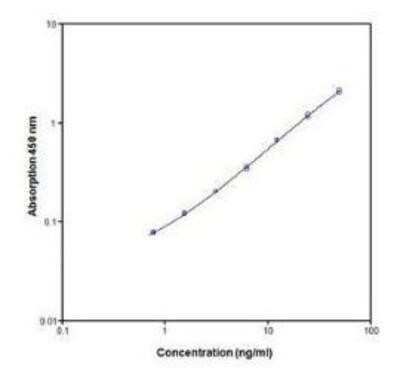Human CD28 ELISA Kit (Colorimetric)
Novus Biologicals, part of Bio-Techne | Catalog # NBP1-91279

Key Product Details
Sample Type & Volume Required Per Well
Cell culture supernatant, serum (50 uL)
Sensitivity
0.18 ng/mL
Assay Range
0.78 - 50 ng/mL
Product Specifications
Assay Type
Sandwich ELISA
Kit Type
ELISA Kit (Colorimetric)
Reactivity
Human
Specificity
The interference of circulating factors of the immune system was evaluated by spiking these proteins at physiologically relevant concentrations into a human CD28 positive serum. There was no crossreactivity detected.
Description
The human sCD28 ELISA is an enzyme-linked immunosorbent assay for the quantitative detection of human sCD28.
Precision
Intra-Assay Precision (Precision within an assay) CV% < 5.90%
Inter-Assay Precision (Precision between assays) CV% < 7.20%
Recovery for Human CD28 ELISA Kit (Colorimetric)
Recovery
The overall mean recovery was 117%. Please see protocol for more specific Spike Recovery details.
Scientific Data Images for Human CD28 ELISA Kit (Colorimetric)
ELISA: CD28 ELISA Kit [Biotin] [NBP1-91279]
Kit Contents for Human CD28 ELISA Kit (Colorimetric)
- Adhesive Films
- Aluminium pouch(es) with a Microwell Plate coated with monoclonal antibody to human sCD28
- Assay Buffer Concentrate 20x (PBS with 1% Tween 20 and 10% BSA)
- Biotin-Conjugate anti-human sCD28 monoclonal antibody
- Human sCD28 Standard lyophilized, 100 ng/ml upon reconstitution
- Sample Diluent
- Stop Solution (1M Phosphoric acid)
- Streptavidin-HRP
- Substrate Solution (tetramethyl-benzidine)
- Wash Buffer Concentrate 20x (PBS with 1% Tween 20)
Preparation and Storage
Shipping
The product is shipped at ambient temperature. Upon receipt, store it immediately at the temperature recommended below.
Stability & Storage
Storage of components varies. See protocol for specific instructions.
Background: CD28
CD28 is the prototypical and best-characterized costimulatory molecule on T cells (4). Its signals are critical for optimal naive T cell activation, cytokine production, proliferation, and survival (4). In order to sustain T cell activation, CD28 will consolidate immunological synapse formation, increase cell cycle progression through upregulated D-cyclin expression, and aid in T cell survival by in inducing the expression of the anti-apoptotic protein Bcl-XL (5). CD28 is constitutively expressed on naive and central memory CD4+ and CD8+ cells (5). CD28 deficiency has a large impact on T cell responses including activation, proliferation, immunoglobulin (Ig) class-switching, and germinal center (GC) formation (6). CD28 is a critical regulator of autoimmune diseases and tolerance to solid organ transplants in human patients (6). The CD28 pathway plays a central role in immune responses against pathogens, autoimmune diseases, and graft rejection (7). CD28 engagement via antibodies augments the proliferation of T cells in response to immobilized anti-CD3 antibodies (8). Additionally, antibody engagement of CD28 can supply costimulation to T cells encountering APCs deficient in costimulatory ligands, such as CD80 and CD86, and prevents the resultant anergic state that otherwise occurs in the absence of costimulatory signaling (8).
References
1. Esensten, J. H., Helou, Y. A., Chopra, G., Weiss, A., & Bluestone, J. A. (2016). CD28 Costimulation: From Mechanism to Therapy. Immunity, 44(5), 973-988. https://doi.org/10.1016/j.immuni.2016.04.020
2. Carreno, B. M., & Collins, M. (2002). The B7 family of ligands and its receptors: new pathways for costimulation and inhibition of immune responses. Annual review of immunology, 20, 29-53. https://doi.org/10.1146/annurev.immunol.20.091101.091806
3. Ward S. G. (1996). CD28: a signaling perspective. The Biochemical journal, 318 (Pt 2), 361-377. https://doi.org/10.1042/bj3180361
4. Zhang, R., Huynh, A., Whitcher, G., Chang, J., Maltzman, J. S., & Turka, L. A. (2013). An obligate cell-intrinsic function for CD28 in Tregs. The Journal of clinical investigation, 123(2), 580-593. https://doi.org/10.1172/JCI65013
5. Evans, E. J., Esnouf, R. M., Manso-Sancho, R., Gilbert, R. J., James, J. R., Yu, C., Fennelly, J. A., Vowles, C., Hanke, T., Walse, B., Hunig, T., Sorensen, P., Stuart, D. I., & Davis, S. J. (2005). Crystal structure of a soluble CD28-Fab complex. Nature immunology, 6(3), 271-279. https://doi.org/10.1038/ni1170
6. Bour-Jordan, H., & Blueston, J. A. (2002). CD28 function: a balance of costimulatory and regulatory signals. Journal of clinical immunology, 22(1), 1-7. https://doi.org/10.1023/a:1014256417651
7. Krummel, M. F., & Allison, J. P. (1995). CD28 and CTLA-4 have opposing effects on the response of T cells to stimulation. The Journal of experimental medicine, 182(2), 459-465. https://doi.org/10.1084/jem.182.2.459
8. Luhder, F., Huang, Y., Dennehy, K. M., Guntermann, C., Muller, I., Winkler, E., Kerkau, T., Ikemizu, S., Davis, S. J., Hanke, T., & Hunig, T. (2003). Topological requirements and signaling properties of T cell-activating, anti-CD28 antibody superagonists. The Journal of experimental medicine, 197(8), 955-966. https://doi.org/10.1084/jem.20021024
Alternate Names
CD28
Gene Symbol
CD28
Additional CD28 Products
Product Documents for Human CD28 ELISA Kit (Colorimetric)
Product Specific Notices for Human CD28 ELISA Kit (Colorimetric)
This product is for research use only and is not approved for use in humans or in clinical diagnosis. ELISA Kits are guaranteed for 6 months from date of receipt.
